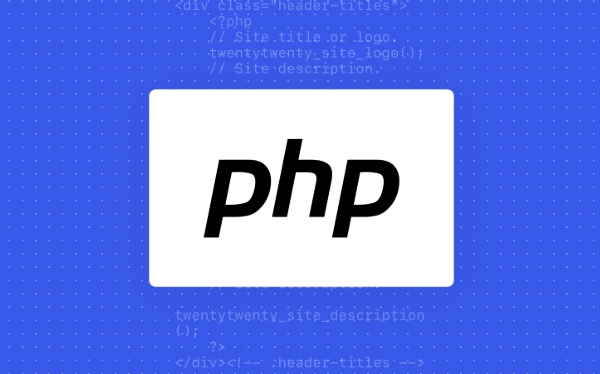How can you use a variable to call a function in PHP?
Jul 21, 2025 am 10:57 AMIn PHP, it is feasible to call a function using variables, which is called a mutable function. The specific method is to assign the function name to a variable as a string, and then call the function by adding parentheses to the variable, such as: $func = 'sayHello'; $func();. This technique is useful when you need to dynamically choose which function to execute based on conditions or inputs, such as in routing logic, callback systems, plug-ins or module systems for simple frameworks. For example, in a simple routing, the corresponding function can be called dynamically through the $_GET parameter, but function_exists() needs to be used to check whether the function exists. Pay attention to security issues when using it, and do not call functions directly based on unverified user input; in addition, variable functions are not suitable for class methods unless used in combination with arrays and functions such as call_user_func(). Overall, the rational use of variable functions can improve code flexibility, but you also need to pay attention to code readability and maintenance.

In PHP, using a variable to call a function is possible through a feature called variable functions . This means you can store the name of a function in a variable and then use that variable to invoke the function.

Here's how it works:
Basic Syntax of Variable Functions
You just assign the function name (as a string) to a variable, and then use that variable followed by parentsthes to call the function:

function saysHello() {
echo "Hello, world!";
}
$func = 'sayHello';
$func(); // This calls sayHello()This is especially useful when you want to dynamically choose which function to run based on conditions or input.
When to Use Variable Functions
There are a few real-world cases where using a variable to call a function can be helpful:

- Routing logic in simple frameworks : You might map URLs to specific functions and call them dynamically.
- Callback systems : You can store which function to call after an action is completed.
- Plugin or module systems : Allowing extensions to register their own handler functions.
For example, imagine a simple router:
function home() {
echo "You're on the home page.";
}
function about() {
echo "You're on the about page.";
}
$page = $_GET['page'] ?? 'home';
$func = $page;
if (function_exists($func)) {
$func();
} else {
echo "Page not found.";
} This way, you can dynamically call different functions based on the page parameter in the URL.
Things to Watch Out For
- Security : Never call a function directly based on user input without validating it first. Always use
function_exists()to check if the function is defined. - Scope : Variable functions only work with regular functions and not with methods inside classes unless you use arrays with
call_user_func()or similar. - Readability : Overusing variable functions can make your code harder to read and debug, especially for others.
If you're working with class methods, consider using:
[$object, 'methodName']
or call_user_func_array() for more complex scenarios.
Summary
Using a variable to call a function in PHP is straightforward with variable functions. It's a powerful feature that can help you write more flexible code, especially when combined with routing, callbacks, or plugin systems. Just remember to validate function names before calling them and keep your code maintainable.
That's the core of it — not too complicated once you get the hang of it.
The above is the detailed content of How can you use a variable to call a function in PHP?. For more information, please follow other related articles on the PHP Chinese website!

Hot AI Tools

Undress AI Tool
Undress images for free

Undresser.AI Undress
AI-powered app for creating realistic nude photos

AI Clothes Remover
Online AI tool for removing clothes from photos.

Clothoff.io
AI clothes remover

Video Face Swap
Swap faces in any video effortlessly with our completely free AI face swap tool!

Hot Article

Hot Tools

Notepad++7.3.1
Easy-to-use and free code editor

SublimeText3 Chinese version
Chinese version, very easy to use

Zend Studio 13.0.1
Powerful PHP integrated development environment

Dreamweaver CS6
Visual web development tools

SublimeText3 Mac version
God-level code editing software (SublimeText3)
 PHP Variable Scope Explained
Jul 17, 2025 am 04:16 AM
PHP Variable Scope Explained
Jul 17, 2025 am 04:16 AM
Common problems and solutions for PHP variable scope include: 1. The global variable cannot be accessed within the function, and it needs to be passed in using the global keyword or parameter; 2. The static variable is declared with static, and it is only initialized once and the value is maintained between multiple calls; 3. Hyperglobal variables such as $_GET and $_POST can be used directly in any scope, but you need to pay attention to safe filtering; 4. Anonymous functions need to introduce parent scope variables through the use keyword, and when modifying external variables, you need to pass a reference. Mastering these rules can help avoid errors and improve code stability.
 How to handle File Uploads securely in PHP?
Jul 08, 2025 am 02:37 AM
How to handle File Uploads securely in PHP?
Jul 08, 2025 am 02:37 AM
To safely handle PHP file uploads, you need to verify the source and type, control the file name and path, set server restrictions, and process media files twice. 1. Verify the upload source to prevent CSRF through token and detect the real MIME type through finfo_file using whitelist control; 2. Rename the file to a random string and determine the extension to store it in a non-Web directory according to the detection type; 3. PHP configuration limits the upload size and temporary directory Nginx/Apache prohibits access to the upload directory; 4. The GD library resaves the pictures to clear potential malicious data.
 Commenting Out Code in PHP
Jul 18, 2025 am 04:57 AM
Commenting Out Code in PHP
Jul 18, 2025 am 04:57 AM
There are three common methods for PHP comment code: 1. Use // or # to block one line of code, and it is recommended to use //; 2. Use /.../ to wrap code blocks with multiple lines, which cannot be nested but can be crossed; 3. Combination skills comments such as using /if(){}/ to control logic blocks, or to improve efficiency with editor shortcut keys, you should pay attention to closing symbols and avoid nesting when using them.
 How Do Generators Work in PHP?
Jul 11, 2025 am 03:12 AM
How Do Generators Work in PHP?
Jul 11, 2025 am 03:12 AM
AgeneratorinPHPisamemory-efficientwaytoiterateoverlargedatasetsbyyieldingvaluesoneatatimeinsteadofreturningthemallatonce.1.Generatorsusetheyieldkeywordtoproducevaluesondemand,reducingmemoryusage.2.Theyareusefulforhandlingbigloops,readinglargefiles,or
 Tips for Writing PHP Comments
Jul 18, 2025 am 04:51 AM
Tips for Writing PHP Comments
Jul 18, 2025 am 04:51 AM
The key to writing PHP comments is to clarify the purpose and specifications. Comments should explain "why" rather than "what was done", avoiding redundancy or too simplicity. 1. Use a unified format, such as docblock (/*/) for class and method descriptions to improve readability and tool compatibility; 2. Emphasize the reasons behind the logic, such as why JS jumps need to be output manually; 3. Add an overview description before complex code, describe the process in steps, and help understand the overall idea; 4. Use TODO and FIXME rationally to mark to-do items and problems to facilitate subsequent tracking and collaboration. Good annotations can reduce communication costs and improve code maintenance efficiency.
 Quick PHP Installation Tutorial
Jul 18, 2025 am 04:52 AM
Quick PHP Installation Tutorial
Jul 18, 2025 am 04:52 AM
ToinstallPHPquickly,useXAMPPonWindowsorHomebrewonmacOS.1.OnWindows,downloadandinstallXAMPP,selectcomponents,startApache,andplacefilesinhtdocs.2.Alternatively,manuallyinstallPHPfromphp.netandsetupaserverlikeApache.3.OnmacOS,installHomebrew,thenrun'bre
 How to access a character in a string by index in PHP
Jul 12, 2025 am 03:15 AM
How to access a character in a string by index in PHP
Jul 12, 2025 am 03:15 AM
In PHP, you can use square brackets or curly braces to obtain string specific index characters, but square brackets are recommended; the index starts from 0, and the access outside the range returns a null value and cannot be assigned a value; mb_substr is required to handle multi-byte characters. For example: $str="hello";echo$str[0]; output h; and Chinese characters such as mb_substr($str,1,1) need to obtain the correct result; in actual applications, the length of the string should be checked before looping, dynamic strings need to be verified for validity, and multilingual projects recommend using multi-byte security functions uniformly.
 Learning PHP: A Beginner's Guide
Jul 18, 2025 am 04:54 AM
Learning PHP: A Beginner's Guide
Jul 18, 2025 am 04:54 AM
TolearnPHPeffectively,startbysettingupalocalserverenvironmentusingtoolslikeXAMPPandacodeeditorlikeVSCode.1)InstallXAMPPforApache,MySQL,andPHP.2)Useacodeeditorforsyntaxsupport.3)TestyoursetupwithasimplePHPfile.Next,learnPHPbasicsincludingvariables,ech






